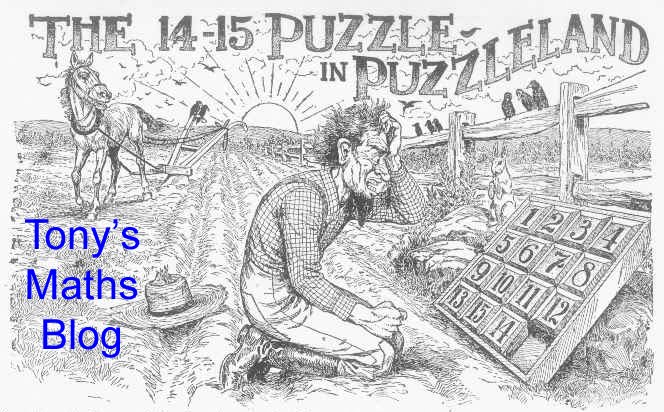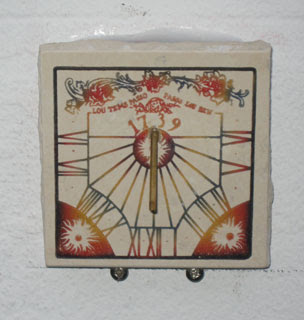Relatively Prime is a new maths podcast from Samuel Hansen. I'm delighted that an early episode, The Toolbox, begins by discussing my favourite area of mathematics, game theory (the subject of my very first post in this blog). Samuel interviews the eminent writer on game theory, Steven J. Brams, whose book The Presidential Election Game I devoured when it first came out many years ago. Brams argues that Shakespeare had an intuitive understanding of game theory and discusses applications of the mathematics in Hamlet and Macbeth.
It is particularly fitting that game theory features in Relatively Prime because game theory contributed to the podcast's very existence. Samuel raised the funding for Relatively Prime through Kickstarter, a crowd-sourcing scheme. Various individuals pledged funds to make the project happen. If Samuel reached his target funding before the deadline, these pledges would be called in; otherwise they would lapse.
I was keen that Relatively Prime should be funded. I admired Samuel's previous work. With Peter Rowlett, he is responsible for the excellent weekly Math/Maths Podcast which has, amazingly, now been going for over two years. (In the interests of transparency I should note that I have contributed to this podcast on a couple of occasions.) Even though Samuel is responsible for the incorrect abbreviation for "Mathematics" in the title of that podcast, I was prepared to consider making a small financial contribution to make Relatively Prime happen.
So consider my situation last summer. I was willing to contribute (a little) to the project, but wasn't sure my contribution would be necessary. From my perspective, the ideal outcome would be that Samuel raised enough from other well-wishers, and I could enjoy the result without paying a penny. But I would rather make a contribution than see the project fail.
No doubt many others are in the same position. We can see how much has been pledged, and if five minutes before the deadline the project had been 5 dollars short, I would certainly have jumped in. But if the project (which sought $8000) were $5000 short just before the deadline, then it's not worth my while wasting time pledging to a lost cause. How do potential donors play it?
Well, I did what no doubt many others did - wait for some time to see what was happening. With a few days to go , there were enough backers to show that there was some interest, but as the deadline day dawned the project was a long way short, but word of mouth was building up. The last few hours were remarkably tense as the pledges started coming in, and suddenly the momentum built up and Samuel reached his target. I was one of the many who contributed on the last day. About 140 people, I think, contributed to Relatively Prime.
As a potential backer one uses game theory here to help achieve the desired outcome, which is that the project gets funded but one doesn't pay more than one's fair share when others were also willing to contribute. How does it work? Nothing significant is going to happen until fairly close to the deadline. I think the intuitive game theorist (like Shakespeare, apparently) would fix a maximum contribution they were prepared to make. They would make a very small contribution at a relatively early stage, to encourage other potential backers by showing that there is some interest, and would then wait until a few hours before the deadline, perhaps committing a little more early on the final day but then hoping that others' contributions will come in. At the last minute, if necessary, they would be prepared to go up to their limit if the target hasn't been reached, but they wouldn't throw all their money in early because that way other intending funders might be let off the hook.
Of course this game theory meant that if Samuel were to reach his target, it would happen at the very last minute (as indeed happened on 3 August last year). The cost of all this game theory was a very nervous few days for Samuel when he was convinced his project would fail. So it is entirely appropriate that Relatively Prime has opened with an illuminating discussion of this fascinating branch of mathematics.
Sunday 30 September 2012
Thursday 20 September 2012
A mathematical device
Thanks to an ingenious mathematical invention we can now tell the time in the garden.
(Added 22/9/12) It seems fairly accurate though I haven't found the switch for the British Summer Time setting yet. Must be on the back where it's inaccessible!
Sunday 16 September 2012
Amazing mathematics - the abc conjecture
I heard earlier this week that the solution to an outstanding mathematical problem, the proof of the abc conjecture, has been announced. (The proof is claimed by Shinichi Mochizuki of Kyoto University, and the ideas are so new and deep that it will take a long time for mathematicians to digest the work and be convinced of the validity of the proof, but the claim is being taken seriously.) Why did this news on Twitter make me happy?
You might think this would have been because it was a problem I have been thinking about for years, that I have attempted to solve myself, that I have lost sleep on. Or perhaps because I am aware of the ramifications for mathematics, the new vistas that will be opened up, the new opportunities that will arise.
Well, I had heard of the abc conjecture. Perhaps I once even knew what it was, but I had forgotten. I have no knowledge of the subject area, the applications (if any) or the methods used.
Yet I am excited by the news of the possible proof! How is it that a development about a problem which I know nothing about, which I couldn't even describe in the most general terms, can matter to me?
Well, here (from the excellent Wikipedia article on the conjecture) is a statement of the conjecture: it asserts that the answer to the following question is "yes": "For every ε > 0, are there only finitely many triples of coprime positive integers a + b = c such that c > d (1+ε), where d denotes the product of the distinct prime factors of abc?" What does this mean? Basically if the conjecture is true, then (as I understand it) it means that only exceptionally is the product of the prime factors of abc significantly less than c.
Now this is, frankly, quite an obscure statement about numbers, and I cannot envisage any life-changing applications. What I find wonderful is that human minds like mine can prove this statement. I cannot even begin to imagine how one would set about proving such a conjecture. I still have an instinctive belief (which, rationally, I know is rather naive) that mathematical facts are true regardless of the nature of the human brain, the laws of nature, and so on: thirteen would still be a prime if the human race had never existed, if the laws of physics were totally different, if no sentient creature had ever come into being. That a mind like mine can establish such necessary, deep facts is amazing, a glimpse of something much more true than anything else in our existence.
You might think this would have been because it was a problem I have been thinking about for years, that I have attempted to solve myself, that I have lost sleep on. Or perhaps because I am aware of the ramifications for mathematics, the new vistas that will be opened up, the new opportunities that will arise.
Well, I had heard of the abc conjecture. Perhaps I once even knew what it was, but I had forgotten. I have no knowledge of the subject area, the applications (if any) or the methods used.
Yet I am excited by the news of the possible proof! How is it that a development about a problem which I know nothing about, which I couldn't even describe in the most general terms, can matter to me?
Well, here (from the excellent Wikipedia article on the conjecture) is a statement of the conjecture: it asserts that the answer to the following question is "yes": "For every ε > 0, are there only finitely many triples of coprime positive integers a + b = c such that c > d (1+ε), where d denotes the product of the distinct prime factors of abc?" What does this mean? Basically if the conjecture is true, then (as I understand it) it means that only exceptionally is the product of the prime factors of abc significantly less than c.
Now this is, frankly, quite an obscure statement about numbers, and I cannot envisage any life-changing applications. What I find wonderful is that human minds like mine can prove this statement. I cannot even begin to imagine how one would set about proving such a conjecture. I still have an instinctive belief (which, rationally, I know is rather naive) that mathematical facts are true regardless of the nature of the human brain, the laws of nature, and so on: thirteen would still be a prime if the human race had never existed, if the laws of physics were totally different, if no sentient creature had ever come into being. That a mind like mine can establish such necessary, deep facts is amazing, a glimpse of something much more true than anything else in our existence.
Sunday 2 September 2012
A lottery oddity
There is a minor news item today about a curious result in the UK National Lottery. Five people who each chose the six correct numbers shared £4.8 million, getting £968,000 each, but the single "runner-up", who matched five of the six main balls plus the bonus ball, won nearly £1.5 million - half as much again as the winners!
This is very unusual: it required several people to pick the same six winning numbers while only a single person chose any of the six possible "runner-up" combinations. Apparently the winning numbers were 15, 30, 36, 39, 41 and 49 and the bonus number was 2.
I am curious about the distribution of the prizes. There are six "runner-up" combinations - any five of the six main balls plus the bonus ball - while only one winning selection, so I would have expected that the pot for the winner would be six times that for the runner-up. Instead it's just over three times. That makes this unexpected result rather more likely than if the relative size of the pots had been proportional to the odds.
Of course, this is good publicity for the lottery (and, as the spokesman says, good news for six people who've won sizeable sums of money).
This is very unusual: it required several people to pick the same six winning numbers while only a single person chose any of the six possible "runner-up" combinations. Apparently the winning numbers were 15, 30, 36, 39, 41 and 49 and the bonus number was 2.
I am curious about the distribution of the prizes. There are six "runner-up" combinations - any five of the six main balls plus the bonus ball - while only one winning selection, so I would have expected that the pot for the winner would be six times that for the runner-up. Instead it's just over three times. That makes this unexpected result rather more likely than if the relative size of the pots had been proportional to the odds.
Of course, this is good publicity for the lottery (and, as the spokesman says, good news for six people who've won sizeable sums of money).
Subscribe to:
Posts (Atom)


